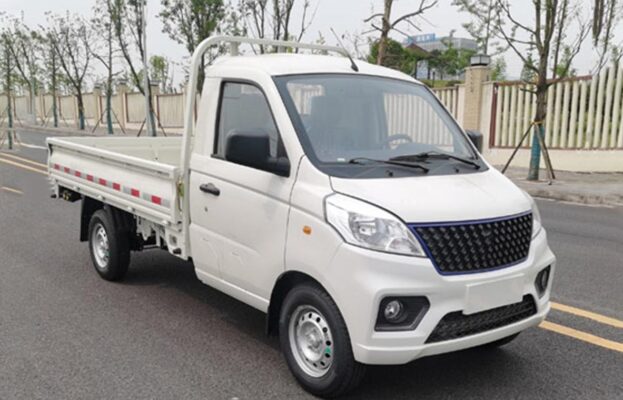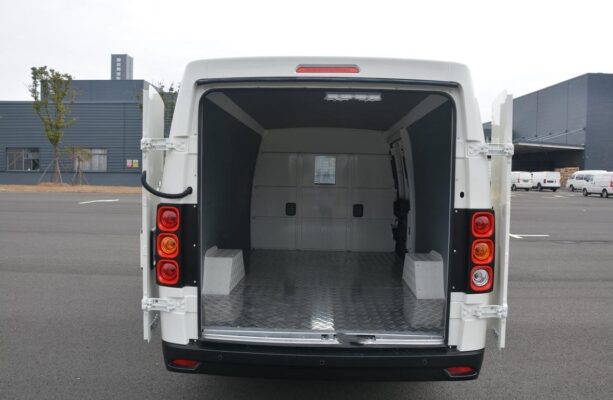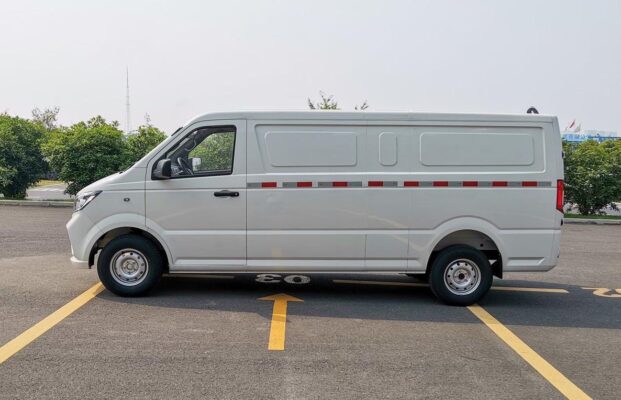Te mau parau apî no te mau pereoo uira
Precautions for the Use of New Energy Electric Vans
Tuuhia i ni'a i te na roto i te Te mau pereoo uira
After all, the new energy electric van is a novel vehicle model, and its driving and usage patterns do exhibit certain differences compared to traditional gasoline vehicles.

The following provides a detailed account of the precautions for its use:
A tahi, when initiating the start, make a conscious effort to depress the accelerator pedal gently and strive to keep the total current within 200A. This approach serves multiple purposes. Not only does it minimize the sense of jerkiness and the likelihood of accidents, but it also has the potential to appropriately extend the driving range of the vehicle. Gradually adapting to the driving dynamics of electric vehicles and cultivating sound driving habits is of paramount importance.
Let’s elaborate on this point. A gentle application of the accelerator pedal results in a smoother acceleration process, providing a more comfortable driving experience for both the driver and passengers. It also reduces the sudden surge of power that can lead to instability and potential safety hazards. Hau atu â, by controlling the current, the energy consumption is managed more efficiently, allowing the vehicle to make the most of its battery capacity and thereby increasing the achievable driving distance.

Piti, during the driving process, it is essential to remain vigilant towards the indicator lights on the instrument panel. In the event of a vehicle malfunction and when the battery parameter values reach the protection set value of the vehicle control unit, the vehicle will enter a reduced power driving mode. Concurrently, the instrument panel will display a prompt indicating reduced power driving.
This feature is designed to safeguard the vehicle’s components and systems from potential damage due to abnormal operating conditions. It is crucial for the driver to be aware of these indicators and take appropriate actions, such as reducing speed or seeking immediate assistance if the issue persists. Regular familiarization with the meanings of various indicator lights and understanding the corresponding responses helps ensure the safe and reliable operation of the vehicle.

A toru, at all times while driving, pay close attention to the battery level (SOC value) displayed on the instrument panel. When the battery level drops below 35%, the system will automatically switch to reduced power operation. It is important to note that when the lowest voltage per unit is lower than 3.5V, the battery level will decline at a relatively rapid pace. Once it reaches 3.00V, the vehicle will cease to be operable. Therefore, it is imperative to ensure that you locate the nearest charging station or return to your residence promptly. It is important to clarify that this situation is not a vehicle malfunction but rather a self-protective and energy-saving feature.
To further emphasize this point, being constantly aware of the battery status allows for better trip planning and avoids unexpected power depletion. Drivers can adjust their driving behavior, such as reducing the use of energy-consuming accessories or modifying the route to include charging stops if necessary. Understanding the battery’s behavior and its implications helps prevent being stranded due to a depleted battery.

A maha, when traversing a water-covered road surface, it is necessary to accurately estimate the water depth. If the water depth exceeds 100 Te mau mana'o tauturu no te, it is advisable to avoid attempting passage. Tera râ,, if the water depth is less than 100 Te mau mana'o tauturu no te, you can proceed at a low speed. It is recommended that the speed does not exceed 10 km/h, the water wading duration does not exceed 5 minutes, and the water wading distance does not exceed 500 m.
It is important to note the following: In the event of overly deep water wading or if the vehicle becomes submerged in water, it is essential to promptly contact the insurance company and the service station for maintenance. Faults resulting from water immersion caused by human negligence or improper actions are not covered under the warranty.

This precaution is vital to prevent potential damage to the vehicle’s electrical systems, drivetrain, and other critical components. Even a seemingly shallow water depth can pose risks if the vehicle is exposed for an extended period or at higher speeds. Quick and appropriate action after water exposure helps minimize the extent of damage and ensures the vehicle’s longevity and performance.
Ei faaotiraa, the use of new energy electric vans requires a heightened sense of awareness and adherence to these precautions. By being well-informed and cautious, drivers can maximize the benefits and reliability of these vehicles while minimizing the potential for issues and ensuring a safe and efficient driving experience.